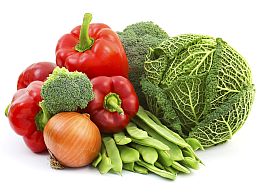Why You Should Eat More Vegetables

Healthy Vegetables
There is much more to why you should eat more vegetables than just listening to your grandmother (or parents or partner) take stock on your health. On many levels, the consumption of vegetables is a very instinctive nutritious need. Have you ever noticed that after a weekend of camping or cooking over an open fire, the novelty of eating grilled meat after grilled meat starts to wear off by the third evening and all you can think of is mowing down on a huge fresh salad? This is not about becoming a vegetarian or raw food vegan – this is about understanding that there is no such thing as too many vegetables and definitely a health issue with consuming too few. Here are some reasons as to why you should eat more from the vegetable food group.
Fiber Fiber Fiber!
Not all fiber is created equally, and although your doctor may have recommended a bowl of All-Bran or Bran Flakes to sprinkle on your daily cereal in order to awaken the bowels and make you more regular, the type of fiber that is contained in live fresh vegetables has a very different function than the fiber contained in carbohydrates and grains.
Most vegetables contain soluble fiber, which turns into a gel-like consistency in your intestines and slows down digestion, which makes you feel fuller for longer, helps control blood glucose levels and lowers cholesterol. Grains contain insoluble fiber, which pretty much stays in the same form in the digestive tract and adds bulk to stool and speeds up the digestive process, keeping your movements regular. Although having bran flakes will help with the insoluble fiber needs, it’s the veggies that will give you the soluble fiber needs and both types are extremely important in gut health.
Antioxidants
The rate of cancer is increasing in the Western World and numerous studies have shown the link between decreased vegetable consumption and an increased rate of cancer. Brightly coloured fruits and vegetables are full of antioxidants which combat cancer cells in the body and hep prevent the formation of tumours. Increased consumption of green and yellow vegetables has been shown to reduce deaths due to cancer in elderly populations (Colditz GA et al, 1985). Increasing consumption of cruciferous vegetables such as broccoli and cabbage has been linked to a better outcome for breast cancer survival (AARC, 2001).
Weight Management
Because they are what are called nutrient-dense foods, as in high in vitamins and minerals and all the lovely things that your body needs in order to remain healthy and happy, but low in calories, they are an essential part of any weight optimisation regimen. They keep you fuller for longer than carbohydrates and sugar, they increase your bowel movement regularity which helps with weight management, they are full of vitamins and minerals that help to cleanse your liver and gut and they help to manage sugar levels and cholesterol levels – all factors in weight gain.
For more info on how to follow a healthy diet see the food pyramids section or the USDA MyPlate dietary guidelines.
References:
G A Colditz, L G Branch, R J Lipnick, W C Willett, B Rosner, B M Posner, and C H Hennekens (1985) Increased green and yellow vegetable intake and lowered cancer deaths in an elderly population. The American Journal of Clinical Nutrition. Vol 41 (1): 32-36.
American Association for Cancer Research (2001). Cruciferous Vegetable Consumption Linked to Improved Breast Cancer Survival Rates. Retrieved from website http://www.AACR.org on 8 July 2013.
-
Advertisement

 Facebook
Facebook  Twitter
Twitter  RSS
RSS







